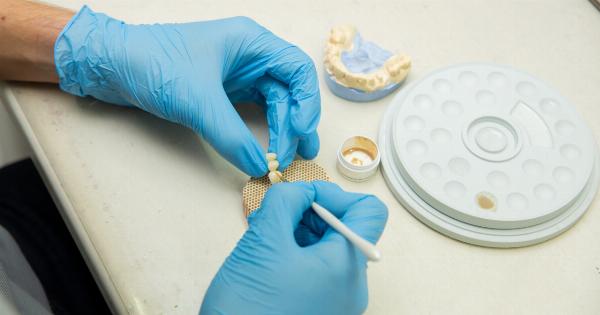Dental implants have become a popular solution for individuals with missing teeth. These implants are surgically placed into the jawbone, providing a stable foundation for dental restorations such as crowns, bridges, or dentures.
While dental implants have a high success rate, certain drugs can impact their stability in the body. It is important for patients and dental professionals to be aware of these drugs and their potential effects on dental implants.
1. Bisphosphonates
Bisphosphonates are a class of drugs commonly used for the treatment of osteoporosis and other bone diseases. While effective for bone health, these drugs can impact the integration and stability of dental implants.
Bisphosphonates inhibit bone remodeling, which is a crucial process for implant osseointegration – the successful integration of dental implants with the surrounding jawbone. Studies have shown a higher risk of implant failure in patients taking bisphosphonates, particularly when administered intravenously.
2. Corticosteroids
Corticosteroids, such as prednisone, are frequently prescribed for various inflammatory and immune-related conditions. These drugs can have immunosuppressive effects, impacting the body’s ability to fight infections.
In dental implant procedures, infections around the implant site can lead to peri-implantitis, a condition that can compromise implant stability. Therefore, it is important for patients on long-term corticosteroid therapy to be closely monitored during and after dental implant placement.
3. Anticoagulants
Anticoagulants, also known as blood thinners, are prescribed to reduce the risk of blood clotting in patients with cardiovascular conditions or those at high risk of thromboembolism.
While anticoagulants are essential for these patients, they can increase the risk of bleeding and hematoma formation around dental implant sites. Dentists should communicate with the patient’s primary healthcare provider to ensure proper coordination and management of anticoagulant therapy during the implant procedure.
4. Non-Steroidal Anti-Inflammatory Drugs (NSAIDs)
NSAIDs are commonly used to manage pain and inflammation. Drugs such as ibuprofen, naproxen, and aspirin belong to this class.
While NSAIDs can provide relief after dental implant surgery, prolonged and excessive use can interfere with bone healing and osseointegration. These drugs inhibit the production of prostaglandins, which are important for the inflammatory response required for bone regeneration and integration.
Patients should follow the recommended dosage and duration of NSAIDs to ensure proper healing and stability of dental implants.
5. Chemotherapy Drugs
Chemotherapy drugs are potent medications used to treat various types of cancer. Unfortunately, these drugs can affect not only cancer cells but also healthy tissues, including bone cells involved in dental implant integration.
Chemotherapy can impair bone healing, weaken the immune system, and increase the risk of infection. It is crucial for patients undergoing chemotherapy to consult with their oncologist and dental professional to assess the feasibility and timing of dental implant placement.
6. Immunomodulatory Drugs
Immunomodulatory drugs, such as methotrexate or tumor necrosis factor inhibitors, are commonly prescribed for autoimmune and inflammatory diseases like rheumatoid arthritis and Crohn’s disease.
These drugs suppress the immune system to alleviate symptoms. However, immune suppression can affect the healing process after dental implant surgery and increase the risk of implant failure.
Close collaboration between the patient’s rheumatologist, dentist, and implant surgeon is essential to determine the appropriateness and timing of dental implant placement.
7. Antidepressants and Anxiolytics
Psychotropic medications like antidepressants and anxiolytics are commonly prescribed to manage mental health conditions. These drugs can influence bone metabolism and potentially affect implant stability.
Some antidepressants, such as selective serotonin reuptake inhibitors (SSRIs), have been associated with an increased risk of implant failure due to their impact on bone density and quality. Patients on these medications should discuss their treatment with both their mental health provider and implant dentist prior to undergoing implant surgery.
8. Anticonvulsants
Anticonvulsant medications are primarily used to treat epilepsy but can also be prescribed for neuropathic pain and other conditions.
Some anticonvulsants, such as phenytoin and valproate, can affect bone health and metabolism, potentially compromising dental implant stability. Patients taking anticonvulsants should inform their dental professional to ensure adequate evaluation and management of the implant procedure.
9. Hormonal Therapies
Hormonal therapies, such as estrogen replacement therapy or aromatase inhibitors for breast cancer, can impact bone density and metabolism. Reduced bone density could affect the integration and stability of dental implants.
Dental professionals should be aware of patients undergoing hormonal therapies and consider appropriate assessment and treatment planning to optimize implant success and long-term stability.
10. Antihypertensive Medications
Antihypertensive medications, including several classes such as beta-blockers or calcium channel blockers, are prescribed to manage high blood pressure.
While these drugs generally do not have a direct impact on dental implant stability, patients with hypertension may be at a higher risk of compromised bone healing and implant failure due to reduced blood flow to the jawbone. Dentists should consider blood pressure management and systemic health when planning dental implant procedures for hypertensive patients.
Conclusion
It is crucial for patients and dental professionals to be aware of the potential impact of certain drugs on the stability of dental implants.
Collaboration between the patient’s healthcare providers is essential to evaluate the risks associated with specific medications and to develop appropriate treatment plans. By considering the effects of these drugs, dental professionals can optimize implant success and improve patient outcomes.




























